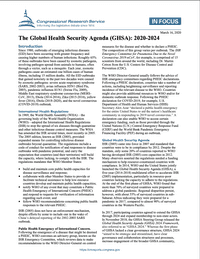Global Health Security Agenda
[GHSA]
The GHSA is a global partnership of governments and international organizations to aims to increase global health security. By 2024, their goal is to have more than 100 countries complete an evaluation of health security capacity and undergo planning and resource mobilization to address gaps.
SUMMARY
The Global Health Security Agenda (GHSA) is a multilateral initiative to improve international compliance with the International Health Regulations (IHR), especially as related to preparing for infectious diseases threats. The GHSA comprises 70 countries, international organizations, and non-governmental organizations that work together to identify and fill gaps in country capacity to prevent, detect, and respond to infectious disease threats. The GHSA encourages collaboration between the health, security, environmental, and agricultural sectors, and emphasizes that global health security should be a priority for national leaders. The GHSA focuses on common, measurable targets that can be easily understood by everyone who engages with it.
The GHSA was first founded in 2014 by the World Health Organization (WHO) and the United States with a five year mandate. In the first phase of GHSA, the focus was on the evaluation of health security capacity. They found that 70% of countries surveyed were prepared to address a global pandemic (this assessment was prior to the COVID-19 pandemic).
In 2018, all GHSA members committed to continuing support for the GHSA priorities through GHSA 2024. In this second phase, which is currently ongoing, the focus is on planning and resource mobilization to close gaps and strengthen capacities.
The GHSA is governed by a Steering Group of 15 rotating GHSA members, whose main tasks are to provide strategic guidance, identify overall GHSA priorities and coordinate among GHSA members.


..png)
